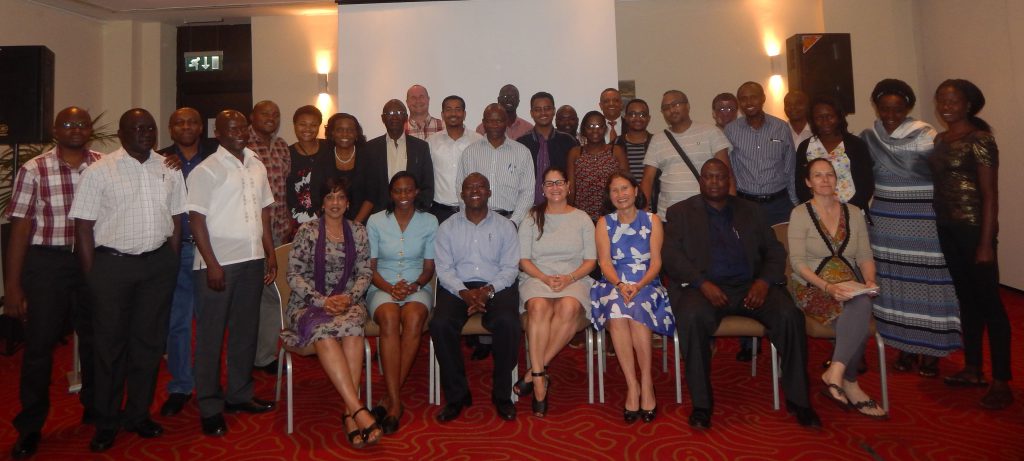Keeping on Point: Ensuring High Quality Point-of-Care Testing in Africa
Keeping on Point: Ensuring High Quality Point-of-Care Testing
East African Leaders Join Together to Develop Country-Specific Plans
Point-of-care-testing (POCT), which includes diagnostic testing performed at or near the point of patient care, serves as a powerful but underused tool in resource-limited settings. When performed correctly and in a timely fashion, POCT improves patient retention and strengthens linkages to treatment and care. [1]
POCT improves local access to health services by bringing technology directly to the patient, and circumvents the need for sample referral – thus avoiding delays in clinical decision-making and permitting initiation of appropriate medical interventions. Research demonstrates that CD4 POCT in sub-Saharan Africa can reduce test turnaround time by approximately 17 days, a significant time savings that may reduce the number of patients lost to follow up. [2]
However desirable, implementation of POCT requires simple, but quality, sample collection at the testing site, easy-to-use test formats, and straight-forward interpretation of results. It must be well-planned and systematic to ensure high quality testing services.
Quality assurance (QA) leaders from East African countries, including Ethiopia, Kenya, Mozambique, Uganda, and Zambia, recently came together on 12-14 October 2015, in Addis Ababa, Ethiopia, to discuss country-specific strategies and models to ensure the quality of POCT. In collaboration with WHO AFRO and the US CDC, the London School of Hygiene & Tropical Medicine (LSHTM) and ASLM brought together country partners and QA specialists to begin the process of outlining options for country-specific national QA plans to support the implementation and scale-up of POCT based on the WHO-CDC Handbook for Improving the Quality of HIV-related POCT. [3]
“While the challenges to providing point-of-care testing are significant, we cannot compromise the quality of testing at any level within the healthcare system,” says Professor Rosanna Peeling, meeting co-convener and Chair of Diagnostics Research at LSHTM. “These consultations provide the POCT community with an invaluable opportunity to discuss these challenges and move us towards the goal of high quality tests and testing in a collaborative manner.”
 The three-day consultation continued a series of regional QA workshops and consultations that began in 2014 to support POCT scale-up in Africa. A two-day training of trainers (TOT) workshop followed the consultation to further focus on building local capacity for field evaluation sites for POCT early infant diagnostic technologies. The Addis Ababa consultations were supported by a grant from UNITAID. UNITAID supports moving diagnostics to the periphery and closer to the site of patient care (point-of-care) so patients can get their results conveniently and quickly. [4]
The three-day consultation continued a series of regional QA workshops and consultations that began in 2014 to support POCT scale-up in Africa. A two-day training of trainers (TOT) workshop followed the consultation to further focus on building local capacity for field evaluation sites for POCT early infant diagnostic technologies. The Addis Ababa consultations were supported by a grant from UNITAID. UNITAID supports moving diagnostics to the periphery and closer to the site of patient care (point-of-care) so patients can get their results conveniently and quickly. [4]
“The local consultations have been successful in bringing together African leaders to address opportunities in point-of-care testing,” says Dr. Jessica Markby, ASLM Senior Technical Advisor. “As the UNAIDS 90-90-90 target year of 2020 approaches, it is more pertinent than ever to address POCT from a collaborative, multinational approach.”
By: Sam Donnenberg, Corey White; Editors: Michele Merkel, Rachel Crane
Media contact: Corey White, Senior Communications Officer (cwhite@aslm.org)
— — —
[1] Wynberg E, Cooke G, Shroufi A, Reid S, Ford N. Impact of point-of-care CD4 testing on linkage to HIV care: a systematic review. JIAS. 2014,17:18809
[2] Wynberg E, Cooke G, Shroufi A, Reid S, Ford N. Impact of point-of-care CD4 testing on linkage to HIV care: a systematic review. JIAS. 2014,17:18809
[3] World Health Organization (WHO) and US Centers for Disease Control and Prevention (CDC), Handbook for improving the quality of HIV-related point-of-care testing. Ensuring the reliability and accuracy of test results. In Press, 2015
[4] UNITAID. HIV Diagnostics – Point-of-Care and Decentralized Testing and Monitoring: http://www.unitaid.eu/en/what/hiv/16-home/994-hiv-diagnostics-point-of-care-and-decentralized-testing-and-monitoring

